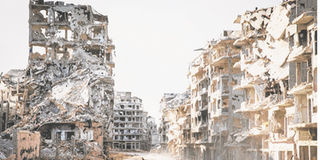Can a deal in Astana finally wind down the six-year Syrian conflict?

The destroyed neighbourhood of Khalidiya in the Old City of Homs, Syria. PHOTO | IRIN
What you need to know:
- “Iran is a criminal, it has no right to be among the guarantor countries.” Opposition delegates then angrily marched out of the hall. The three government negotiators seem to have shrugged it off and proceeded to sign the agreement, thereby endowing Syria with yet another ceasefire deal to end its six-year war. So what does it say?
On Thursday, the envoys of Russia, Turkey, and Iran sat down to sign an agreement about Syria in the Kazakh capital of Astana. As the signing process commenced, they were suddenly interrupted by a cry from a member of the Syrian opposition:
“Iran is a criminal, it has no right to be among the guarantor countries.” Opposition delegates then angrily marched out of the hall. The three government negotiators seem to have shrugged it off and proceeded to sign the agreement, thereby endowing Syria with yet another ceasefire deal to end its six-year war. So what does it say?
The three men who signed the new Astana agreement were Russian presidential envoy for Syria Alexander Lavrentyev, deputy undersecretary Sedat Önal from the Turkish Ministry of Foreign Affairs, and Iran’s deputy foreign minister Hossein Jaberi Ansari. The agreement itself builds on a now nearly five-month-old ceasefire declared on December 30 by their three countries – partly a response to the fall of the opposition enclave in eastern Aleppo that helped sway pro-rebel Turkey to seek an understanding with its pro-government rivals in Russia and Iran.
Talks about a long-term ceasefire were tacked onto the truce from January onwards. Since then, the Astana meetings have functioned as a complementary negotiating track to the main, UN-led peace process in Geneva. Russia has tended to lead the way with energetic diplomacy, even as Iran at times seemed to drag its feet, while Turkey seemed uncertain about its current priorities but eager to be at the table. Unsurprisingly, the 4 May agreement’s proposed evolution from a truce to a long-term de-escalation plan appears to have originated with Russian President Vladimir Putin.
Four areas for de-escalation are mentioned in the agreement: the Islamist-controlled opposition enclave in and around Idlib in northwestern Syria; the Rastan-Talbiseh enclave north of Homs; the Ghouta enclave east of Damascus; and rebel-controlled areas of the Houran and Golan regions near the Jordanian border. In effect, the agreement amounts to a truce between President Bashar al-Assad and the internationally supported segments of the Syrian opposition, while simultaneously leaving Turkey free to pursue its war on hostile Kurdish factions and allowing all parties to wage war on the so-called Islamic State.
The deal stipulates that al-Assad’s government will stop all flights over the de-escalation regions, from Saturday, when a six-month renewable truce will also begin. Russia has said it will continue overflights but refrain from air strikes, if violence actually ends. Humanitarian aid will be allowed by al-Assad’s government into rebel-controlled areas, and public services like water and electricity will resume where they have been cut. In the meantime, political talks will continue in both Geneva, possiblyin May, as well as in Astana, in mid-July.
“We as guarantors – Turkey, Iran, Russia – will do everything for this to work,” Putinsaid after a meeting with Turkish President Recep Tayyip Erdogan in the Russian city of Sochi. Erdogan, for his part, has boasted that the agreement will solve half of the Syrian conflict, apparently considering the other half to consist of Turkey’s problem with the Kurds.
Both Russia and Turkey – but less so Iran – have persistentely tried to draw the United States into the Astana process. The United States has held back, both out of disenchantment with Russia’s failure to restrain al-Assad during earlier ceasefire attempts and in protest at Moscow’s undermining of a US-Russian deal on chemical weapons in Syria – but also because the Americans remain unconvinced by the Astana track’s chances for success. However, the Russians seem to be hoping that the new de-escalation areas may appeal to President Donald Trump, whose rather vague Syria policy includes both a desire to scale back US confrontation with al-Assad and to establish some form of safe zones into which refugees can be repatriated.
Freelance journalist and analyst specialising on Syria, and regular IRIN contributor




